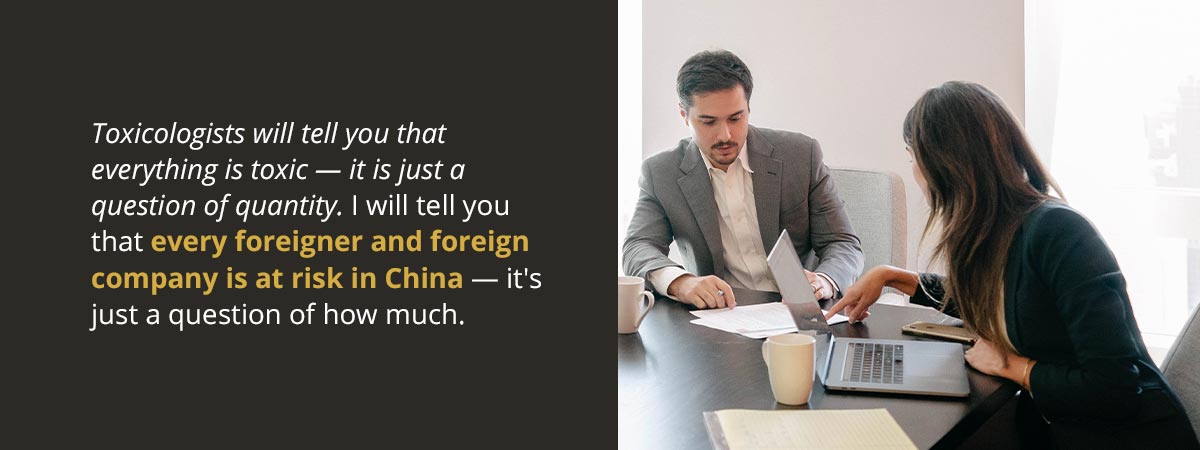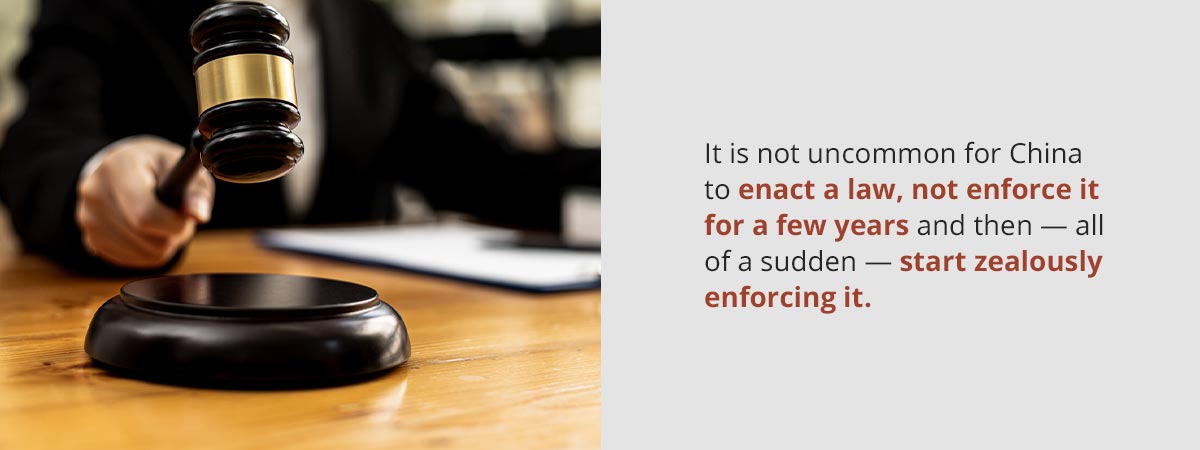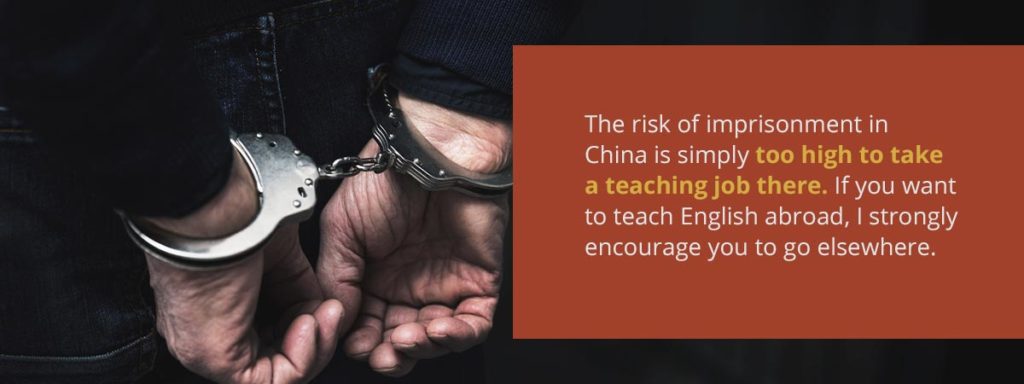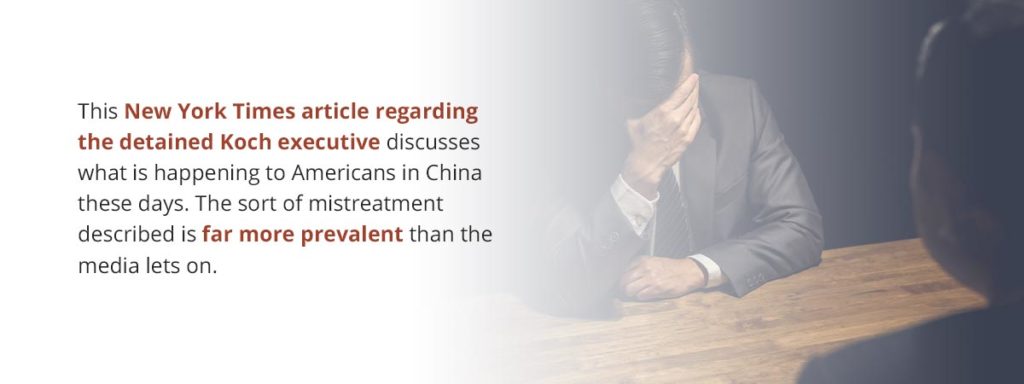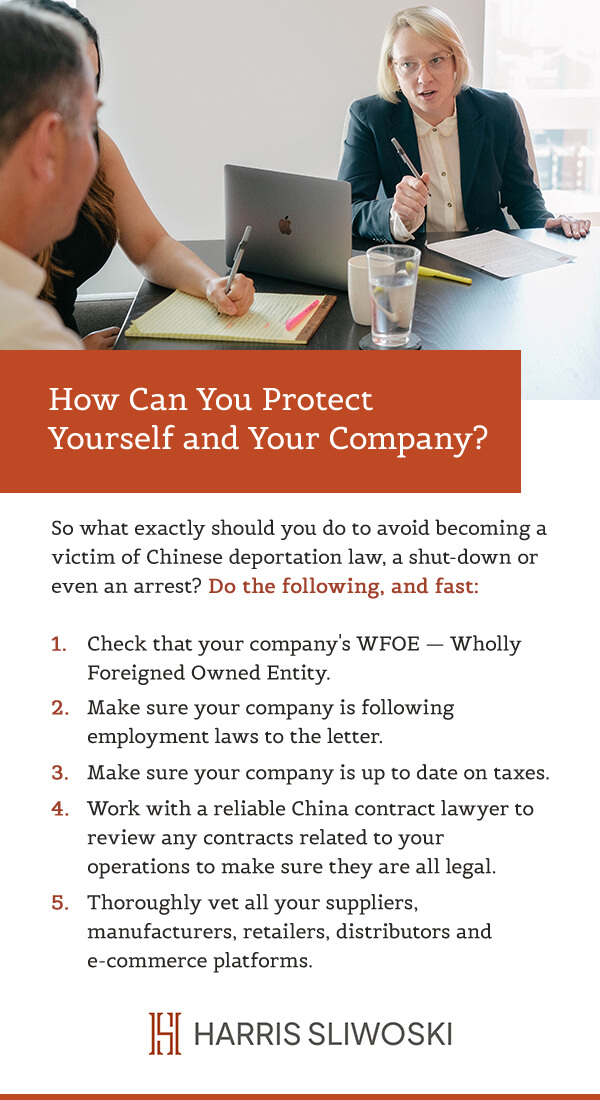Contents of this Article:
- The Situation: Foreigners at Risk in China
- The Inconsistency of Chinese Law and Punishment
- The Risks of Working and Living in China
- Stay Within Chinese Law
- How Can You Protect Yourself and Your Company
- A NOT New Idea: Keep Your Mouth Shut
Toxicologists will tell you that everything is toxic; it is just a question of quantity. I will tell you that every foreigner and foreign company is at risk in China; it’s just a question of how much.
The Situation: Foreigners at Risk in China
In 2019, The New York Times ran a story on two Americans who had been detained in southern China, describing the incident as part of a series of similar prosecutions that indicated a growing sense of unease for Western foreigners in China.
These individuals, former leaders of an Idaho-based English-language teaching company, were detained under charges of illegally transporting people across borders — though it appears all they really did was recruit English teachers to come to China. I say “appears” because I have limited facts regarding this particular case, but that is what I have gathered from reading about it.
As of May 2022, one of those then-detained individuals — Alyssa Petersen, the company’s director — has been released. The other individual — company founder Jacob Harlan — remains jailed in China with no word on the future of his case.
The article also notes a couple other well-publicized detentions of Americans in China, such as:
- Chinese authorities held and interrogated a Koch Industries executive in southern China for several days before permitting him to leave the country.
- Chinese authorities detained a FedEx pilot on charges of weapons smuggling. He was released on bail shortly after his arrest but remained under investigation and was not permitted to leave the country for nine months.
Another important point is the U.S. Department of State’s (DOS) travel advisory warning Americans to exercise increased caution when in China. The DOS recently updated this advisory to include the following risks:
- Quarantine and testing: China’s zero-tolerance approach to COVID-19 requires foreign travelers to quarantine for a minimum of seven days upon their arrival. During this period, you could undergo COVID testing — potentially daily. If you test positive, you could be transferred to a government-designated facility until you test negative for the virus. Additionally, you may be subjected to additional testing and quarantining after the initial quarantine period ends and to movement restrictions within the country.
- Lockdowns: Arbitrary COVID-19 lockdowns, also known as “dynamic static management of COVID-19,” can be enacted anywhere in China at any time with little notice, if any.
- Exit bans: The Chinese government has barred some people from leaving the country for various reasons, including forcing foreigners to participate in government investigations as well as leveraging them as bargaining chips in disputes with foreign governments. Many times, foreigners only become aware of exit bans when they attempt to leave China.
The New York Times article mentioned above includes a quote from me, noting the seriousness of the risks associated with travel to China. Little things that were virtually ignored for years are now landing foreigners in Chinese prisons.
Though released foreigners give harrowing accounts of what Chinese prisons are like, the Chinese government outright denies their claims. Either way, I can assure you you don’t want to experience prisons in China for yourself.
The Inconsistency of Chinese Law and Punishment
Like basically every country in the world, China is inconsistent in enforcing its laws. It is not uncommon for China to enact a law, not enforce it for a few years and then — all of a sudden — start zealously enforcing it. Conversely, China will sometimes zealously enforce some of its laws for a while and then relax its enforcement. A great example of this was how tough Chinese law enforcement was in the run-up to the 2008 Beijing Olympics.
It’s also common for some regions of China to strongly enforce a particular law while others take a more relaxed approach. Chinese law enforcement — or the degree to which laws are enforced — depends heavily on who is violating the law. For example, China has generally been tougher on foreign companies than domestic ones.
Right now, what you need to know is that China is cracking down on foreign companies and individuals — this is especially true for those from Canada, the United States and the United Kingdom.
Important Points of Chinese Criminal Law
If your company is doing business in China or Hong Kong, there are some key things you should know in case you or any of your employees end up in trouble:
- Your behavior outside China — especially online — can make you a government target.
- If you are detained and interrogated, you have a right to legal representation from the date of your first interrogation.
- You have the right to communicate with a consular official from your home country according to the Vienna Convention on Consular Relations (VCCR).
- You do not have the right to remain silent if you are detained.
- You might encounter exit bans even if you are not detained.
The Risks of Working and Living in China
I want to talk briefly about English teachers working in Chinese schools. Now, if you think that you can stop reading because you’re not an English teacher, you are very wrong. English teachers are the canary in the coal mine in terms of China’s increasing hostility toward foreigners.
In another blog post, I highlighted the major problems foreign English teachers face in their jobs that could easily put them on the wrong side of Chinese criminal law. I eventually concluded that the risk of imprisonment in China is simply too high to take a teaching job there. If you want to teach English abroad, I strongly encourage you to go elsewhere. Sorry.
The Increasing Risk of Doing Business in China
Tolerance of foreigners in China — especially for Canadians, Americans and Brits — is rapidly declining. As a result, living, working and doing business in China is much more legally complicated than it was a decade ago. The likelihood of you going astray of Chinese law is considerably higher as well.
When you add in the Chinese government’s increased ability and desire to catch foreign companies and individuals operating illegally, you can see why operating within Chinese law is critical for you and your company. This is the new normal for China, so if you are not already operating legally, you need to start doing so now. If you cannot, you should probably leave China or avoid going there entirely.
When foreign employees end up in Chinese jails, it almost never makes the news — and there are two good reasons for that:
- Companies want to avoid the publicity.
- Publicizing that your company or employees are in trouble in China is a really bad idea because all it does is cause the Chinese government to get its back up — and become even less likely to back down.
Trust me, though, when I tell you things are indeed happening behind the scenes to all sorts of companies and people in China.
Stay Within Chinese Law
Despite all these issues for foreigners in China, plenty of foreign companies still operate illegally within the country, often because they believe they have no choice. These companies commonly claim two things:
- They’ve been doing what they’re doing for years with no consequences.
- Other foreign companies do the same thing, and nobody has gone to jail.
Our China lawyers typically give the following response:
“You are violating Chinese law by operating this way. China is in open conflict with the United States/Canada, and your company will be violating the law in a sensitive area — the Internet — that the PRC government has identified as a national security issue.”
This New York Times article regarding the detained Koch executive discusses what is happening to Americans in China these days. The sort of mistreatment described is far more prevalent than the media lets on. American businesspeople are either afraid to publicly discuss what is happening or they do not wish to do so, but we hear similar stories from American companies all the time.
They come to us surprised and a little perturbed that they got into trouble for doing the same thing they’d always done. When we inform these businesspeople that what they were doing is illegal, their response typically goes something like, “Well, the Chinese government always allowed it, and it’s not like we’re the only ones doing this.”
If that sounds like you, consider this — What will happen if someone from your company gets detained or if you get shut down and essentially banned from China?
Let’s say your company is competing with a large Chinese company in a city that the company completely controls. I can easily imagine the Chinese company inspecting your website, finding something they perceive to be negative and then convincing local authorities to crack down on you. Authorities might even end you as a competitor and use you to scare others away.
How Can You Protect Yourself and Your Company?
So what exactly should you do to avoid becoming a victim of Chinese deportation law, a shut-down or even an arrest? What exactly does all of this mean for your company if it is doing business in China, and what can you do to reduce your risks?
If past performance is any indicator of future performance — and we really don’t have anything else to go on, so we have to assume it is — you should do the following, and fast:
- Check that your company’s WFOE — Wholly Foreign Owned Entity — joint venture or representative office actually exists and is licensed to do business in every place you currently do business. Additionally, make sure you are up to date on capital obligations.
- Make sure your company is following employment laws to the letter — consider running an employer audit to find any problems that may exist.
- Make sure your company is up to date on taxes.
- Work with a reliable China contract lawyer to review any contracts related to your operations to make sure they are all legal. Additionally, become familiar with all business crimes unique to China, as these may not be considered crimes in the West.
- Thoroughly vet all your suppliers, manufacturers, retailers, distributors and e-commerce platforms. The company you keep determines your risk.
I could go on and on. None of the above are new, but with what is going on in China today, their importance and their urgency have increased exponentially. Get fully legal. Now.
But what is your risk if you do get legal, and what is your risk if you don’t? The answer depends on many factors, including:
- Who you are
- Where you come from
- What you and your company are doing in China
- What you have said about China online
- Your history in China
These are some of the main factors we typically look at in assessing China risks.
A NOT New Idea: Keep Your Mouth Shut
Recently, (summer of 2022), we have increasingly getting reports of “activist” foreigners in China getting arrested for alleged drug violations. We need to be really vague here because we are working on at least one such case, but we believe local Chinese governments are having drugs planted in the residences of foreigners the local government views as difficult. If you are expressing your ideas on issues (and again, we are being deliberately vague here) that you think MIGHT be unpopular with the powers that be in China, you are at major risk. Though we cannot get into the sorts of issues that could cause you problems, please trust us when we say that they include anything that might be deemed to harm Chinese culture or its political class.
If you think that you might be known by people in China for having these ideas, I urge you to leave China as soon as you possibly can. Repeat, get the hell out of China right away.
If you have ideas that might not be appreciated in China and have yet to express them in a way that would reveal to those in China that you hold such ideas, KEEP YOUR MOUTH SHUT, and if you do not believe you are capable of doing so, I urge you to leave China right away.











